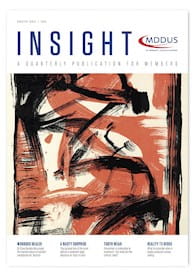LIKE the boy in Hans Anderson’s story of the Emperor’s New Clothes, but with the eye of a physician, Richard Alan John Asher spoke up and revolutionised medical practice.
He was born in Brighton, the son of Louise and Reverend Felix Asher and educated at Lancing College. He learned to write elegantly, with wit and to the point, played music and acted. Activities he enjoyed for the rest of his life. He studied medicine at The London Hospital and qualified in 1936. After a few years at the West Middlesex, and now with MRCP, he was appointed physician to the Central Middlesex in 1943, a hospital that was badly damaged by bombs in WW2.
In those days the mantra of doctors and nurses was "keep diseased parts at rest", which meant bedrest for patients. Richard overturned that philosophy in an article published in The Lancet in 1947: 'The Danger of Going to Bed'. It changed attitudes and saved patients from long stays in bed that had damaging effects on the body.
The medical profession came in for more criticism when he gave a talk: 'The Seven Sins of Medicine'. These were: obscurity, cruelty, bad manners, over-specialisation, love of the rare, common stupidity and sloth. The talk was later published in The Lancet and widely quoted.
Another thing that caught Richard’s observant eye was that some patients would go from doctor to doctor and take their fictional diseases to distant hospitals. When the deceit convinced a doctor, they were willing to suffer all sorts of treatment. Asher distinguished this from malingering and gave it the name Munchausen's syndrome.
He was not always happy about the assignation of names: for example, he thought Pel-Ebstein fever characteristic of Hodgkins disease did not need to be so called. More misleadingly subdural haematoma was known by a clumsy name 'pachymeningitis interna haemorrhagica' which inferred that it was an inflammatory condition and delayed the discovery that it follows head injury and is curable by operation.
Always a general physician, he was particularly interested in haematology, endocrinology and the organic causes of mental illness – all subjects that were in their infancy and he made notable contributions to them. He was invited to head the mental observation ward at the Central Middlesex, where, through observation, he identified the cause of mental illness in a group of patients. It was because of thyroid deficiency.
He wrote: "I consider there is only one infallible confirmatory test for myxoedema. Take a good photograph; then give thyroid for a month or more and take another photograph. The change between the two photographs is clear confirmation of the diagnosis. In many cases where I have not been certain of the diagnosis the change recorded by photographs has been the only unequivocal proof of the answer."
He was able to instil in others his understanding of the practice of medicine at the teaching unit of the Central Middlesex (part of the Middlesex Hospital Medical School). Medical students taught by him included Jonathan Miller and Oliver Sachs.
In 1952 he was elected FRCP and in 1959 gave the Lettsomian lectures to the Medical Society of London (founded in 1773 by the Quaker physician Dr John Coakley Lettsome as a forum for discussion of difficult cases). Asher became President of the Clinical section of the Royal Society of Medicine in 1964, a sad year for him because he was replaced as head of the mental observation ward at the Central Middlesex. He resigned and this marked the end of his distinguished medical career. He had been lauded in America and in the United Kingdom.
He married a musician Margaret Eliot in 1943. They lived above his practice in Wimpole Street and there raised a family, Peter, Jane and Clare. At some time in his life he had a gastrectomy and had further surgery but this did not sap the vibrant energy he gave to his profession. Five years after retiring he committed suicide. The obituary in The Lancet called him a "superb diagnostician" and a "brilliant performer". He was also remembered as a generous and charming man.
In 1972 a book of many of his excellent lectures was published, called Richard Asher talking sense. The RSM and the Society of Authors award a prize in his memory for the best first edition of a textbook for undergraduates. Anthologies of his writings have also been published.
Julia Merrick is a freelance writer and editor
This page was correct at the time of publication. Any guidance is intended as general guidance for members only. If you are a member and need specific advice relating to your own circumstances, please contact one of our advisers.
Read more from this issue of Insight

Save this article
Save this article to a list of favourite articles which members can access in their account.
Save to library